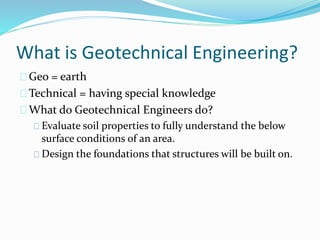Some Ideas on Geotheta You Should Know
Some Ideas on Geotheta You Should Know
Blog Article
Geotheta - The Facts
Table of ContentsSee This Report about GeothetaGeotheta Can Be Fun For EveryoneHow Geotheta can Save You Time, Stress, and Money.The Definitive Guide for GeothetaFacts About Geotheta Revealed

They perform website examinations, collect samples, execute laboratory examinations, and analyze data to examine the viability of the ground for construction jobs - Consulting Engineer. Based upon their searchings for, geotechnical engineers supply recommendations for foundation layout, incline security, maintaining structures, and reduction of geotechnical risks. They work together with various other professionals, such as architects, structural engineers, and building and construction groups, to make certain that geotechnical considerations are incorporated right into the general project style and application
By analyzing the actions and buildings of dirt and rock, they can recognize prospective geotechnical hazards such as landslides, soil negotiation, or incline instability. Their proficiency aids protect against failings or accidents that could endanger lives and home. Here are some comprehensive obligations and duties of a geotechnical engineer: Website Investigation: Geotechnical engineers conduct website investigations to collect data on subsurface problems.
They interpret the data to understand the properties and behavior of the soil and rock, including their stamina, permeability, compaction features, and groundwater problems. Geotechnical Evaluation and Style: Geotechnical designers evaluate the data gathered throughout site investigations to analyze the security and suitability of the website for building and construction tasks. They carry out geotechnical computations and modeling to evaluate aspects such as birthing capacity, settlement, incline stability, side planet stress, and groundwater circulation.
How Geotheta can Save You Time, Stress, and Money.
Structure Layout: Geotechnical engineers play a critical function in developing foundations that can safely support the intended framework. They assess the dirt conditions and tons needs to figure out the suitable foundation type, such as superficial foundations (e.g., footings), deep foundations (e.g (https://soundcloud.com/geotheta)., heaps), or specialized strategies like dirt improvement. They consider factors such as negotiation restrictions, birthing ability, and soil-structure communication to create optimum foundation designs
They review construction plans, display website tasks, and carry out field evaluations to verify that the layout recommendations are adhered to. If unpredicted geotechnical concerns arise, they analyze the scenario and provide referrals for remediation or changes to the layout. Threat Evaluation and Reduction: Geotechnical engineers assess geotechnical threats and risks connected with the project site, such as landslides, liquefaction, or dirt disintegration.

Cooperation and Communication: Geotechnical engineers function closely with various other professionals associated with a job, such as architects, architectural engineers, and construction teams. Reliable interaction and cooperation are vital to incorporate geotechnical factors to consider right into the general job layout and building process. Geotechnical engineers provide technological expertise, answer inquiries, and ensure that geotechnical needs are fulfilled.
Some Ideas on Geotheta You Need To Know
Right here are some sorts of geotechnical designers: Structure Designer: Structure engineers focus on creating and assessing foundations for frameworks. They assess the soil conditions, tons demands, and website attributes to identify the most proper foundation type and design, such as superficial structures, deep foundations, or specialized methods like stack structures.
They review the variables influencing incline stability, such as soil homes, groundwater conditions, and incline geometry, and create strategies to avoid slope failings and alleviate threats. Quake Designer: Quake engineers focus on assessing and creating structures to endure seismic pressures. They assess the seismic danger of a site, assess soil liquefaction potential, and develop seismic layout standards to make certain the safety and security and resilience of frameworks during earthquakes.
They perform area screening, gather examples, and examine the gathered information to characterize the dirt homes, geologic formations, and groundwater problems at a site. Geotechnical Instrumentation Engineer: Geotechnical instrumentation designers focus on monitoring and gauging the habits of dirt, rock, and frameworks. They install and keep instrumentation systems that check elements such as dirt settlement, groundwater degrees, slope activities, and structural variations to examine performance and supply very early cautions of potential issues.
The Ultimate Guide To Geotheta
They conduct examinations such as triaxial examinations, loan consolidation tests, straight shear examinations, and leaks in the structure examinations to gather data for geotechnical evaluation and style. Geosynthetics Engineer: Geosynthetics designers concentrate on the design and application of geosynthetic materials, such as geotextiles, geogrids, and geomembranes. They make use of these products to boost soil security, enhance slopes, offer drain solutions, and control erosion.
They tend to be investigative individuals, which means they're intellectual, reflective, and analytical. They are curious, methodical, rational, analytical, and sensible. Some of them are likewise social, suggesting they're kind, generous, cooperative, patient, caring, practical, compassionate, skillful, and friendly - Engineer of Record.
In the office atmosphere, geotechnical engineers make use of specialized software tools to execute calculations, create styles, and assess data. They prepare reports, evaluation task specs, connect with clients and team members, and coordinate project tasks. The workplace setup provides a conducive environment for research, evaluation, and collaboration with various other specialists associated with the job.
Indicators on Geotheta You Should Know
They often check out project sites to carry out site investigations, assess geotechnical problems, and collect information for analysis. These visits entail traveling to different locations, often in remote or difficult surfaces. Geotechnical designers may carry out soil sampling, conduct tests, and monitor building tasks to make sure that the geotechnical aspects of the job are being applied correctly.
Geotechnical designers likewise function in specialized geotechnical laboratories. In these centers, they conduct experiments, do tests on dirt and rock samples, and assess the design homes of the materials. Geotechnical lab engineers function extensively in these settings, taking care of testing equipment, operating tools, and tape-recording information. They collaborate with other laboratory personnel to guarantee precise and reputable screening results.
Report this page